Azúcar Moreno is a Spanish music duo composed of sisters Antonia "Toñi" and Encarnación "Encarna" Salazar. The duo has sold more than three million albums and singles since 1984 domestically, and became famous in Europe, the United States and Latin America in the 1990s, with approximately twelve million albums sold worldwide.

The Easybeats were an Australian rock band which formed in Sydney in late 1964. They are best known for their 1966 hit single "Friday on My Mind", which is regarded as the first Australian rock song to achieve international success; Rolling Stone described it as "the first international victory for Oz rock". One of the most popular and successful bands in the country, they were one of the few Australian bands of their time to foreground their original material; their first album Easy (1965) was one of the earliest Australian rock albums featuring all original songs.

"María" is a song recorded by Puerto Rican singer Ricky Martin for his third studio album, A Medio Vivir (1995). The song was written by Ian Blake, Luis Gómez Escolar, and KC Porter, while the production was handled by Porter, Tom Vickers, and Steve Berkowitz. It was released by Sony Music Mexico as the second single from the album on November 21, 1995. A Spanish language flamenco, dance, and salsa song, it is about an attractive but dangerous woman called "María". Local DJ Pablo Flores remixed the song, turning it into an up-tempo samba tune in a house bassline. The remix version became more popular than the original one.
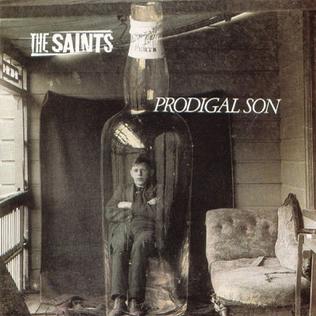
Prodigal Son is the eighth studio album released by The Saints. It was released in 1988.
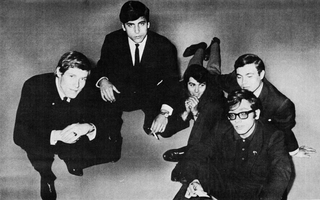
Los Bravos were a Spanish beat group, formed in 1965 and based in Madrid. They are most well known for their debut single "Black Is Black" which reached No. 2 in the United Kingdom in July 1966 and No. 4 in the United States, selling over a million records worldwide.

Easy is the debut studio album by the Australian rock band the Easybeats, released on 23 September 1965.

Vigil is the fifth studio album by Australian rock band The Easybeats, released in May 1968. This would be the second and final album by the band released on the United Artists Records label.
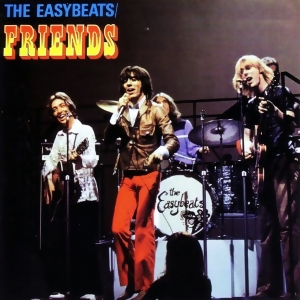
Friends is the sixth and final studio album by Australian rock band the Easybeats. It was released in early 1970 as part of the group's new recording contract with Polydor Records. It would be the only album Polydor released of the band as they broke up before its release.

The Best of The Easybeats Volume 2 is the second compilation album by the Australian rock group The Easybeats. The album was first released on October 9, 1969 by the group's Australian label Albert Productions. The compilation album was released to coincide with the band's 1969 Australian tour.

Vanda & Young were an Australian songwriting and producing duo composed of Harry Vanda and George Young. They performed as members of 1960s Australian rock group the Easybeats where Vanda was their lead guitarist and backing singer and Young was their rhythm guitarist and backing singer. Vanda & Young co-wrote all of the Easybeats' later songs including their international hit "Friday on My Mind" and they produced themselves from 1967. Young was the older brother of Malcolm and Angus Young of the hard rock band AC/DC and younger brother of Alexander Young of the English band Grapefruit.

Olé is the ninth studio album by Spanish duo Azúcar Moreno, released on Sony International in 1998.

Mas Que Alcanzar una estrella (Album) is the soundtrack to the film Mas Que Alcanzar una estrella. It was released in 1992. The album includes songs by artists such as Eduardo Capetillo, Mariana Garza, and Ricky Martin, among others.
In the movie, Muñecos de Papel is formed by Ricky Martin, Bibi Gaytan, Alejandro Ibarra and Lorena Rojas. It is unclear whether they contributed vocals for "Sha La La La" and "Apertura", which are simply credited to Various (Various).
The song "Mas que alcanzar una estrella" premiered during the closing credits of the last episode of Alcanzar una estrella II, and was also included in Eduardo Capetillo's first solo album Dame una noche.
Mariana Garza's "Contra tu cuerpo" was the third opening song for Alcanzar una estrella in 1990, but the full version remain unreleased until this album.
"Dime que me quieres" had already been a hit single from Ricky Martin's debut album the previous year.

Good Friday is the fourth studio album by The Easybeats, released in May 1967. It was the first album released after the band signed an international recording deal with United Artists Records. The original UK album was released in May 1967. Although "Friday on My Mind" was a big single in the UK, the album failed to make the top 40.

Friday On My Mind is the first North American album from The Easybeats. The album was released as Good Friday in Europe, in the same month. This version omitted "Hound Dog" and replaced it with "Women" from the Australian It's 2 Easy album.

"The Music Goes 'Round My Head" is a 1967 song and single by Australian rock group The Easybeats, which was written by band members George Young and Harry Vanda.
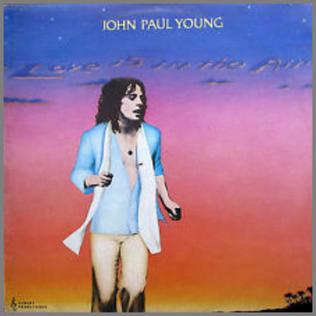
Love Is in the Air is the fourth studio album by Australian pop singer John Paul Young, released in 1978. The album was produced by Vanda & Young and released through Albert Productions. It peaked at number 32 in Australia. The album spawned the singles "Love Is in the Air", "The Day That My Heart Caught Fire", "Lost in Your Love" and "Fool in Love".

"For My Woman" is a song by Australian rock band the Easybeats, written by singer Stevie Wright and guitarist George Young. The Easybeats had formed in Sydney in 1964, with a sound inspired by the Pretty Things and the Rolling Stones. After signing with their manager Mike Vaughan, he introduced the band to producer and businessman Ted Albert, who liked them enough to sign with his company Albert Productions in December 1964. The song was recorded in January 1965 at the 2UW Theatre in Sydney as a demo together with three other songs.
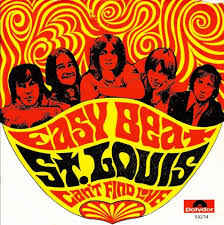
"St. Louis" is a song by Australian rock group the Easybeats, which was released in June 1969. It was co-written by its members Harry Vanda and George Young and recorded as their first single after signing to Polydor Records.
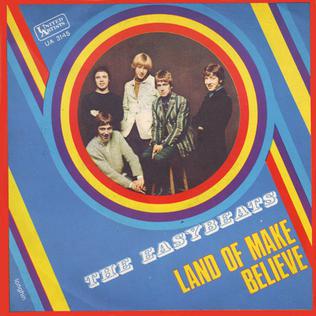
"Land of Make Believe" is a 1968 song and single by Australian rock group the Easybeats, which was written by band members George Young and Harry Vanda. It was also released on the band's fifth album Vigil.

"Lay Me Down and Die" is a song by The Easybeats released as a single in Australia November 1968. It was written by George Young and Harry Vanda. It was first released as an instrumental in September 1968 in the UK as the B-side to the "Good Times" single.



















